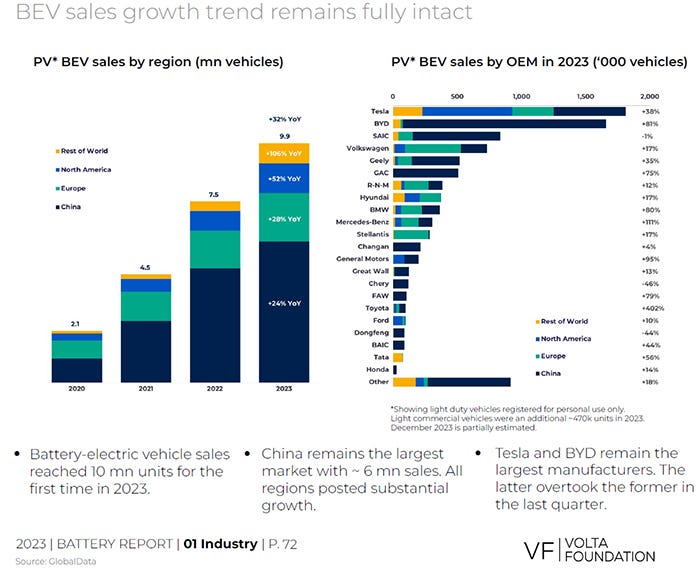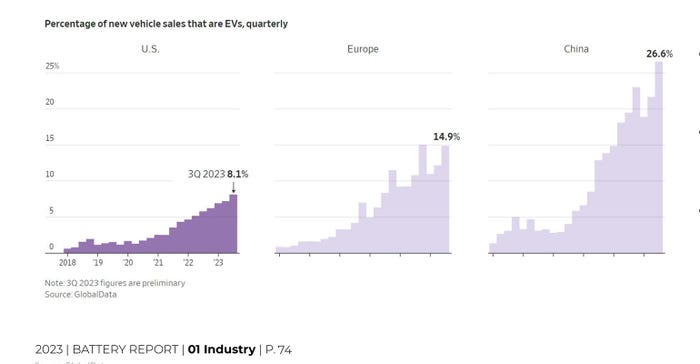Report: EV Production Caution is Worldwide; China Still Dominates
Volta Foundation Battery Report 2023 details the pressures on the EV industry—and each company’s responses, exploring challenges and opportunities shaping the electric vehicle industry's future.

Within the Volta Foundation Battery Report 2023, one focal point is the exploration of factors shaping the trajectory of Electric Vehicle (EV) adoption, detailing how the EV sector is undergoing substantial transformation. The 300-page report, released publicly this week, presents a landscape rich with opportunities as well as challenges.
Recent developments in the EV sector
Volta Foundations states, “Mixed pullback in EV output; OEMs cite slow demand, but the reality is more complex.” Recent developments—highlighted in the report—among major EV players shed light on the complexities facing this growing sector. From production adjustments to market adoption hurdles, the landscape of EVs reflects a dynamic interplay of technological advancement, economic considerations, and consumer behavior.
For example, Polestar—an EV manufacturer based in China—announced a reduction in its 2023 production guidance coupled with a 10% cut in headcount. According to the report, this decision stems from delayed production starts for its Polestar 3 model and the prevailing challenges within the industry environment. Such setbacks underscore the intricacies of transitioning from traditional manufacturing to EV production, with supply chain disruptions and market uncertainties exerting pressure on companies.

Battery Electric Vehicle (BEV) sales. Credit: Volta Foundation under CC BY 4.0 Deed.
However, the report also highlights Mercedes-Benz's challenges. Mercedes-Benz disclosed a lower-than-anticipated EV adoption rate in the United States as the reason for the accumulation of slow-selling EVs on its dealership lots. This signals a mismatch between supply and demand dynamics, prompting the company to reassess its strategies for market expansion.
Despite growing environmental consciousness and governmental incentives, consumer adoption of EVs seems to remain a gradual process. Similarly, the report highlights Ford's reduction in the production plan for the F-150 Lightning reflects the pragmatic adjustments required to align production capacities with market demand projections. The decision underscores the imperative for flexibility and responsiveness in adapting to shifting market dynamics and operational constraints.
The report also mentioned Tesla’s action to confront challenges arising from macroeconomic factors and interest rate fluctuations as impediments to consumer affordability, prompting a cautious approach to expansion plans such as building a new assembly plant in Mexico. This reflects the intricate relationship between economic conditions, consumer behavior, and corporate decision-making within the EV industry.
Other EV industry challenges
Volta Foundation states, “The industry is also dealing with interest rates, high inventories, workforce strikes (US), concerns over residual selling value, and a competitive environment from continuous price cuts and stronger ‘pure-play’ manufacturers.” The report underscores the EV industry's challenges, shedding light on its multifaceted landscape. As the sector undergoes significant transformation, challenges and opportunities abound.
China's dominance in EV adoption
The report also underscores China's remarkable growth since the pandemic's onset, contrasting sharply with the more gradual trajectories in the US and Europe. The report states, “China continues to be the powerhouse of EV adoption.”

Percentage of new vehicle sales that are BEVs. Credit: Volta Foundation under CC BY 4.0 Deed.
As per the report, this surge in China's growth is primarily attributed to government incentives, similar to the potential impact of IRA policies on US growth. Despite global economic challenges, China remains a dominant force in the adoption of EVs. The proactive measures implemented by the Chinese government have been instrumental in driving this growth, emphasizing the pivotal role of policy support in shaping the future of the EV industry.
The Volta Foundation Battery Report 2023 provides crucial insights into the evolving EV industry landscape. With China's continued dominance in EV adoption propelled by government incentives, the report emphasizes the significance of policy support in driving sector growth. Despite challenges like market dynamics and macroeconomic uncertainties, resilience, adaptability, and strategic foresight will be key for EV manufacturers to drive the transition toward sustainable mobility solutions.
Special thanks to Volta Foundation for making their work available. Slides are shared to Battery Technology under Creative Commons CC by 4.0 Deed license.
About the Author(s)
You May Also Like





